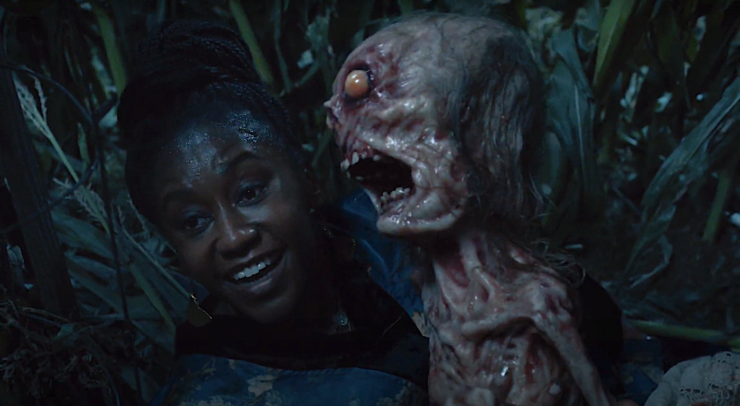I have severe cultural FOMO. I hate it when I miss TV shows or books that are perfect for me, it leads to serious self-recrimination. (This past weekend I finally watched Hail, Caesar and A Serious Man and kept having to pause the movies to berate myself for sleeping on them.) I don’t take many things seriously, but I dig my job, and if I want to consider myself a pop culture critic I have a responsibility to keep up, and provide thoughtful commentary, right? Especially now, when people are doing their best to stay home and turning more than ever to TV marathons and movie nights to stay sane in the face of a pandemic and economic and political turmoil.
So how the heck did I miss out on Evil last year? It’s basically a Stefon club tailored to my needs: Mike Colter plays David Acosta, Hot Priest-in-Training, who investigates possessions with two skeptical partners: forensic psychologist/former mountain climber/very lapsed Catholic Kristen Bouchard (Katja Herbers) and tech wiz/snark machine/very lapsed Muslim Ben Shakir (Aasif Mandvi). Together, they solve spiritual crime CBS-style, with impeccable sweaters and soulful eye contact, until, inevitably, the Bigger Plot Arc Reveals Itself.
This show is legitimately scary? And surprisingly nuanced and deep? And you can marathon the whole season on Netflix while you wait for Season 2 to hit CBS.
David Acosta is in his third year of seminary and works as an assessor for the Catholic Church, which means he looks into alleged demonic possessions, possible miracles, rumored prophecies, and other inexplicable events that fall under the heading of Stuff The Church Should Keep An Eye On. He meets forensic psychologist Kristen Bouchard when they both investigate a man accused of serial murder, and when Dr. Bouchard’s boss pushes her a little to often, she decamps to work with David after he assures her that he wants her to bring her most skeptical self to each assessment. She quickly bonds with David and Ben Shakir, who seems to be a handyman/jack-of-all-trades in regular life, but who gets to unleash his full tech wizardry by freelancing for David. Kristen enjoys the challenges of the work, and it pays better than her old job, which is good news since she has four daughters and her husband, Andy, is off at his job—guiding tourists up Everest. (!!!)
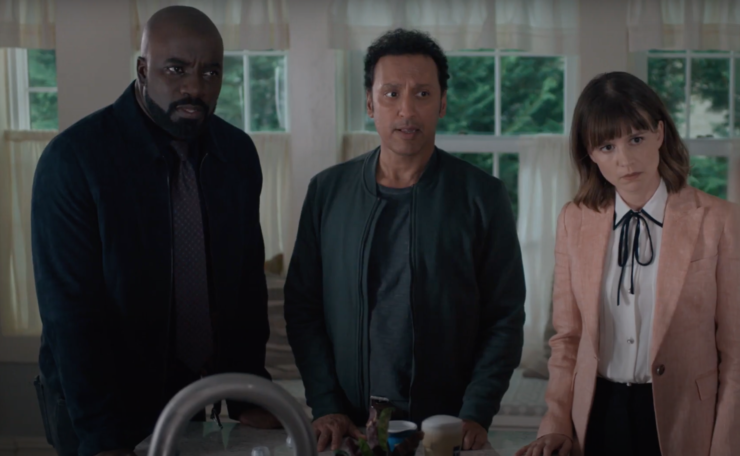
Over thirteen episodes David, Kristen, and Ben investigate everything from a troubled young boy who won’t stop hurting his baby sister, to an influencer whose videos might hold subliminal messages, to David’s own father, a painter whose work may have a connection to a sinister conspiracy. You’ll notice all the “mights” and “maybes” here, because, unlike Brimstone, The Exorcist, or Supernatural, Evil leaves room for science as well as the Holy Spirit. David Acosta is Catholic, and dedicated enough to give up sex and family life for the priesthood. But he also still has moments when his faith falters, and when he questions giving everything up for a church that isn’t always easy to love. Kristen and Ben, meanwhile, consider religion a fairytale—but they respect David, and the show is very good at mapping out how the characters give each other space while refusing to compromise their beliefs. Later in the season, a character’s Buddhist practice is treated with the same care as David’s Catholicism.
Buy the Book
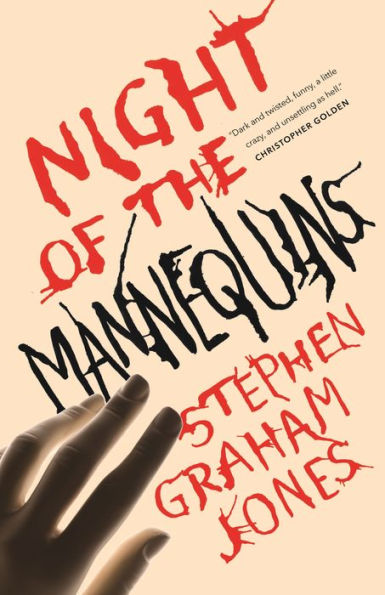

Night of the Mannequins
The show itself, meanwhile, gives plenty of evidence for both sides: when it chooses to give us a demon, it goes all out with terrifying effects; when it favors a psychological explanation, the writers makes sure to get their diagnoses right. But, vitally, the episodes are properly scary in addition to be thoughtful. Kristen is haunted by a creature named George (either a demon or a night terror) whose malevolence lies in his spiteful glee rather than the (fantastic) make up job. The possessions and exorcisms are brutal. When Kristen’s daughters log in to a scary VR game, they’re greeted by Rose390, who looks like a Victorian ghost dressed up as Annabelle for Halloween. And that’s before we get to episode 11, “Room 320”, which is set in a hospital and rivals “Hush” for most frightening hour of broadcast TV I’ve ever seen. As the show continues, the horror hits harder and harder because we come to care about the characters so much.
I was extremely impressed by the way Evil digs into modern society—several episodes focus explicitly on systemic racism, not in a Very Special Episode way, but in an ongoing, “David and Ben have to do their jobs while dealing with threats and oppression” way. Late in the season, Kristen points out that nearly all the possessions they’ve investigated involve women—a fact that neither of the guys noticed. Evil tackles incels, computer hacking, fakey ghost hunting shows, and, somehow, the ongoing trauma from the Rwandan genocide of the 1990s, and treats each topic with gravity and nuance.
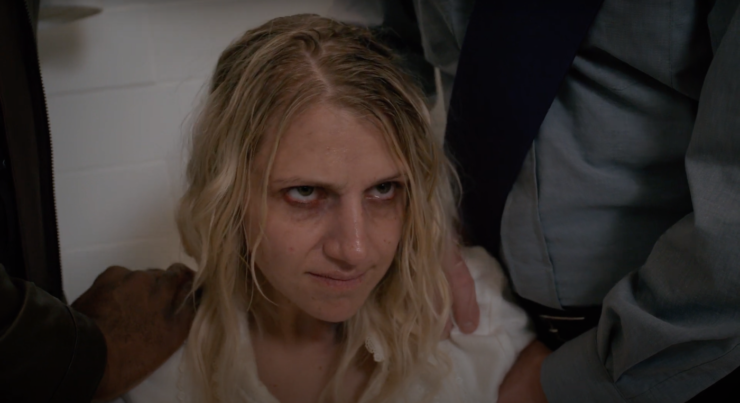
But I fear I am not getting across how fun and bonkers this show is, so have Some Brief Unscientific Thoughts about Evil:
- John Glover, the Devil in the much-lamented Fox show Brimstone, plays an arrogant theater producer who might be possessed! And he’s GREAT.
- The cast of Evil is stacked. Broadway stars including Annaleigh Ashford and Renee Elise Goldsberry pop up for small roles, Peter Scolari plays a priest, Christine Lahti plays Kristen’s (extremely cool, leather-panted) mom, and, best of all, Michael Emerson plays a man named Leland Townsend who might be a demon, or might be a garden-variety psychopath, but either way is just deliciously slimy and punchable.
- At one point it’s revealed that David Acosta speaks Italian? And that’s all I can tell you about that because when Mike Colter started speaking Italian I blacked out.
- Did I mention that there’s an episode where Ben investigates “the most haunted strip club in Jersey City”? Because that happens, too.
- Yes, of course there’s a SECRET VATICAN CONSPIRACY.
- David lives in like, the seminary attic, I think? And has his bed perfectly centered beneath an arching window in a way that makes my New-York-apartment-living-heart ache. Also, a bird lives on a beam over his desk, and he just lets it stay there.
- If you think religion would be better if people used more hallucinogenic mushrooms, several people in Evil agree with you!
- Do you like demon babies? Evil might have an episode or two for you.
- The opening credits occur at different point in each episode, which I only mention because they crash into the action in often hilarious ways! Plus there’s a shot of a black-beaded rosary falling onto a pure white background that is revealed to be MILK.
- Completely unnecessary? Yes.
- The greatest aesthetic choice of 2020? Quite possibly!
Also, this is how the show introduces us to different types of possession:
Evil could have just been a Demon of the Week procedural, with the three charismatic leads taking on a new case each episode, figuring out whether a person was possessed, psychologically disturbed, or both. It also could have threaded in a Big Possession Arc, like The Exorcist did in its two nigh-perfect seasons (that you should immediately go watch on Hulu because they’re incredible).
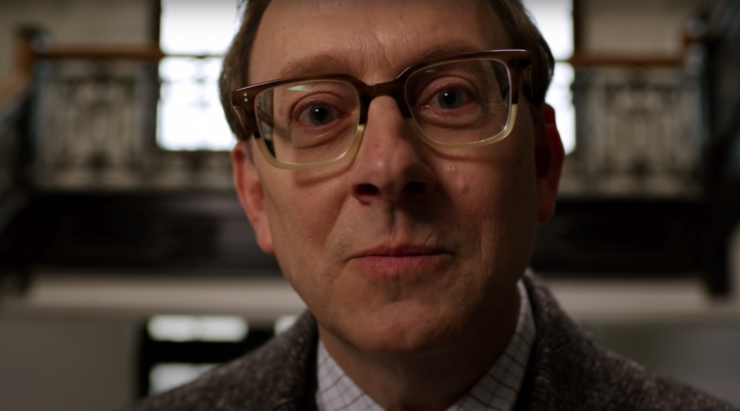
Instead, showrunners Robert King & Michelle King tick off both of those boxes, but also use each episode to explore evil as a concept. Sometimes a demon seems to be the villain, but there are episodes where the root of the problem is racism, or misogyny, or post-partum depression. A young man plans a killing spree because he thinks women are meant to be subjugated by men. Hospitals that treat white patients better than Black ones turn out to be a recurring, increasingly malevolent theme. Adults log into games meant for children to mess with them—sometimes just for a sense of perverse glee, sometimes to truly hurt them.
Are these people being egged on by demonic forces? Or are they just displaying the worst of human nature, with no supernatural help at all? The show often leaves this open to interpretation so it can nudge its audience toward contemplating what constitutes good and evil in everyday life—and how often does network TV do that? If you’re looking for something spooky to watch this Halloween week, might I suggest a show that balances jump scares with a fearless moral inventory?
Leah Schnelbach tries to be a decent person, but must admit to coveting the heck out of David Acosta’s incredible apartment. (The skylights! The high ceilings! The bird nest!) Come discuss the true nature of Evil on Twitter!










